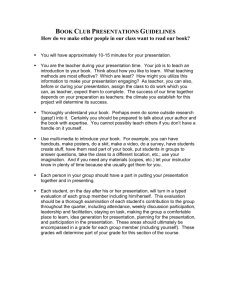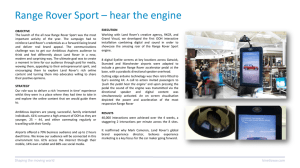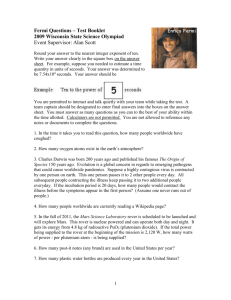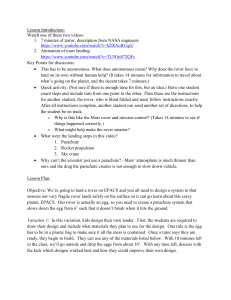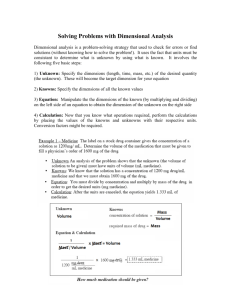THE LAND ROVER PARTS MARKET The spare parts market can be
advertisement
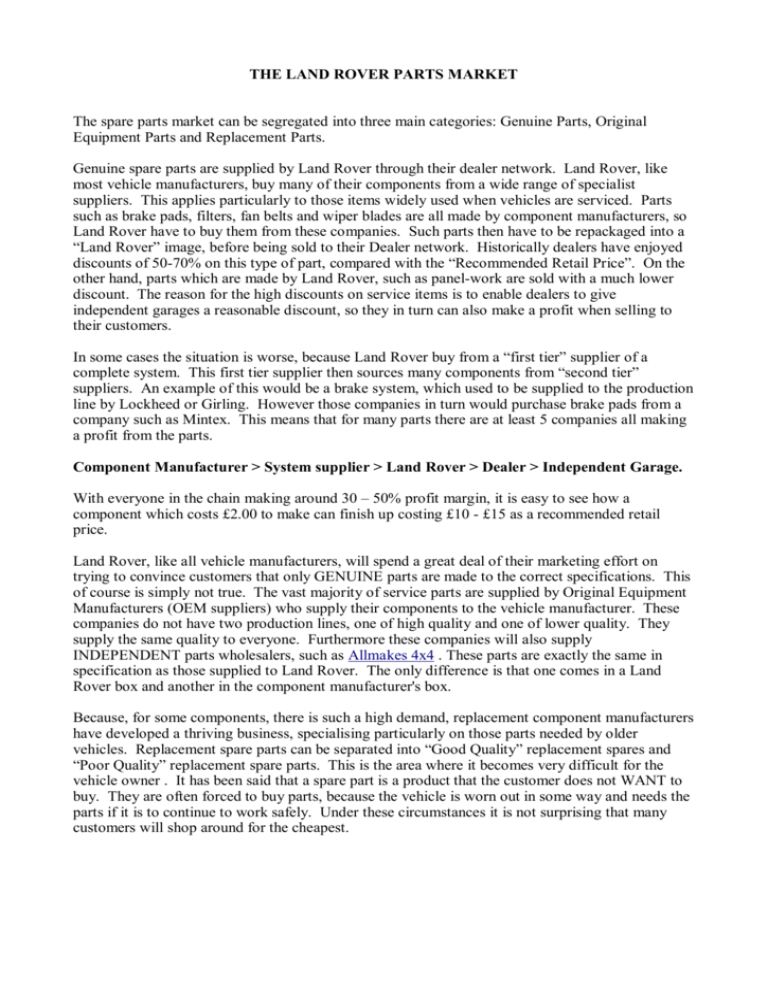
THE LAND ROVER PARTS MARKET The spare parts market can be segregated into three main categories: Genuine Parts, Original Equipment Parts and Replacement Parts. Genuine spare parts are supplied by Land Rover through their dealer network. Land Rover, like most vehicle manufacturers, buy many of their components from a wide range of specialist suppliers. This applies particularly to those items widely used when vehicles are serviced. Parts such as brake pads, filters, fan belts and wiper blades are all made by component manufacturers, so Land Rover have to buy them from these companies. Such parts then have to be repackaged into a “Land Rover” image, before being sold to their Dealer network. Historically dealers have enjoyed discounts of 50­70% on this type of part, compared with the “Recommended Retail Price”. On the other hand, parts which are made by Land Rover, such as panel­work are sold with a much lower discount. The reason for the high discounts on service items is to enable dealers to give independent garages a reasonable discount, so they in turn can also make a profit when selling to their customers. In some cases the situation is worse, because Land Rover buy from a “first tier” supplier of a complete system. This first tier supplier then sources many components from “second tier” suppliers. An example of this would be a brake system, which used to be supplied to the production line by Lockheed or Girling. However those companies in turn would purchase brake pads from a company such as Mintex. This means that for many parts there are at least 5 companies all making a profit from the parts. Component Manufacturer > System supplier > Land Rover > Dealer > Independent Garage. With everyone in the chain making around 30 – 50% profit margin, it is easy to see how a component which costs £2.00 to make can finish up costing £10 ­ £15 as a recommended retail price. Land Rover, like all vehicle manufacturers, will spend a great deal of their marketing effort on trying to convince customers that only GENUINE parts are made to the correct specifications. This of course is simply not true. The vast majority of service parts are supplied by Original Equipment Manufacturers (OEM suppliers) who supply their components to the vehicle manufacturer. These companies do not have two production lines, one of high quality and one of lower quality. They supply the same quality to everyone. Furthermore these companies will also supply INDEPENDENT parts wholesalers, such as Allmakes 4x4 . These parts are exactly the same in specification as those supplied to Land Rover. The only difference is that one comes in a Land Rover box and another in the component manufacturer's box. Because, for some components, there is such a high demand, replacement component manufacturers have developed a thriving business, specialising particularly on those parts needed by older vehicles. Replacement spare parts can be separated into “Good Quality” replacement spares and “Poor Quality” replacement spare parts. This is the area where it becomes very difficult for the vehicle owner . It has been said that a spare part is a product that the customer does not WANT to buy. They are often forced to buy parts, because the vehicle is worn out in some way and needs the parts if it is to continue to work safely. Under these circumstances it is not surprising that many customers will shop around for the cheapest. “Good Quality” replacement parts are usually manufactured by organisations that supply other vehicle manufacturers with similar products, but are not supplied as original to Land Rover. For example a shock absorber manufacturer may supply Mercedes or Toyota as an OE supplier, but not Land Rover. Their parts would be then be considered as “Replacement” spare parts. It is unlikely that such parts would be manufactured to a lower specification than is normally produced by the supplier, when supplying Mercedes for example. Such replacement parts can therefore be considered as “Good Quality”. It is in the area of “Poor Quality” replacement spare parts that the vehicle owner has to be very careful. Typically such spares are made from inferior materials, or they do not have the same manufacturing tolerances as other parts. These parts are often manufactured in areas of the world where labour is cheap. Because Land Rovers are widely used in the developing world, there is a strong demand for this type of part, simply because they are cheap. Too often the developing world cannot afford the prices charged by Land Rover or indeed OE manufacturers, so they have no choice but to buy “Poor Quality” parts. Unfortunately in many cases the use of such spares is extremely dangerous, particularly for safety related parts. Brake pads can be made of a material which may be suitable for a lightweight car, but simply does not have the capability to stop heavier vehicles, like Land Rovers, quickly enough. In many cases now, fake parts are being sold as “imitations” of well known brands. In the developing world there is no such thing as MOTs and copyright laws often don't exist, so there really is no control the supply of such parts. Indeed some of these parts are becoming freely available on the UK market. How do you, the owner, identify such parts? How can you be sure that you are buying parts which are not of inferior quality, or even fakes? Firstly be very careful about buying from any supplier who claims to be the cheapest or who says they will match any price on the web. For many parts this means they can only be supplying poorer quality replacement parts. Secondly look carefully at the warranty given by the supplier. Retailers such as The Land Rover Parts Shop are giving at least 12 months warranty. Retailers who give this type of warranty could not afford to if the parts they supplied were of inferior quality. If you are having your vehicle repaired at an independent specialist, ask whether their parts supplier offers both a parts AND LABOUR warranty. Good wholesalers are prepared to back their quality by paying labour costs in the unlikely event there is a problem. Other wholesalers only offer the minimum of perhaps 6 months, and will simply replace the part that has failed with an identical one free of charge (as they are required to by law). They are certainly not prepared to pay labour costs if the part fails. Copyright Hugh Smith June 2006

